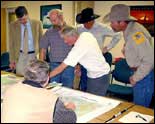















Successes in Stewardship: April 2003 |
|---|

|
Federal Highway Administration
April 2003
Promoting Collaborative Conflict Management: FHWA's Guidance and Workshops
Conservation and development, mobility and air quality, politics and agency missions - these and other competing factors influence transportation project delivery and the environmental review process. Bring them together during project planning and development, and conflict can result. But conflict is not always negative. In fact, if handled productively, conflict can lead to creative solutions. How can agencies take advantage of the positive aspects of conflict? Conflict management is the answer.

In December 2002, the Federal Highway Administration (FHWA) released "Collaborative Problem Solving: Better and Streamlined Outcomes for All." This new guidance helps state and Federal agencies manage conflict and resolve disputes during the transportation project development and environmental review processes. The guidance is not prescriptive, but rather offers a range of optional tools agencies can use to manage conflicts. FHWA developed the guidance in collaboration with the U.S. Institute for Environmental Conflict Resolution (IECR) and the Federal Interagency Streamlining Group. Based on the guidance, FHWA and IECR are currently finalizing the format for facilitated workshops to be held in each of the ten standard Federal regions.
The new guidance and workshops are two of the four elements of FHWA's National Dispute Resolution System. The system includes:
To download "Collaborative Problem Solving: Better and Streamlined Outcomes for All," visit: http://www.fhwa.dot.gov/environment/strmlng/cmgtnepa.asp.
Benefits of Conflict Management
|
Practices for Preventing or Overcoming Conflicts
|
The ABC's of FHWA's Guidance on Managing ConflictFHWA's guidance provides agencies with a diverse menu of tools, methods, and strategies. The guidance includes information on:
No one technique suits all circumstances. Instead, states can tailor a variety of techniques to meet their unique needs, including:
Facilitated Workshops for Improving Transportation Project Development and Environmental Reviews through Collaborative Problem SolvingEducating front line staff involved in the preparation, oversight, and review of environmental documents and the issuance of environmental permits to use collaborative problem solving skills and ADR techniques is key to improving transportation decision-making and expediting environmental reviews. To education these staff, FHWA and IECR are developing a series of facilitated, customized workshops held in each of the ten standard Federal regions. The workshops will be based on the FHWA conflict management guidance and structured to reinforce working relationships, including the relationship among the Federal-Tribal-state teams involved in the NEPA review process for transportation projects. The workshops will also improve understanding of Federal agencies' roles and responsibilities. Staff at the practitioner level - those who are involved in early coordination meetings and who review and provide comments on environmental documents - are the intended workshop attendees. An important part of each workshop will be the discussion of topics of specific concern and interest to that region. FHWA and IECR are planning and scheduling the workshops, which will be held May through December 2003. Conflict Management and Environmental Streamlining/StewardshipConflict management can help agencies meet the environmental streamlining goals of the Transportation Equity Act for the 21st Century (TEA-21), the Environmental Stewardship and Transportation Infrastructure Project Reviews Executive Order, and FHWA's Vital Few Goal for Environmental Stewardship and Streamlining. To foster streamlining, agencies should coordinate with partners early and often and integrate the project development and environmental review processes. Agencies can use conflict management tools and techniques to meet these goals through collaborative decision-making and problem solving among a wide variety of partners, including state and Federal resource and permitting agencies, local governments, interest groups, and the public. Managed appropriately, conflict can be beneficial. By promoting involved parties to recognize differing perspectives and to accommodate diverse interests, managed conflict can lead to the development of innovative transportation solutions that enhance and protect the environment. |
Contact InformationRuth Rentch |
|
For more information on environmental streamlining, please visit: www.fhwa.dot.gov/environment/strmlng/index.asp. "Successes in Stewardship" is a Federal Highway Administration newsletter highlighting current environmental streamlining practices from around the country. To subscribe, contact Cassandra Allwell at (617) 494-3997 or allwell@volpe.dot.gov. |
